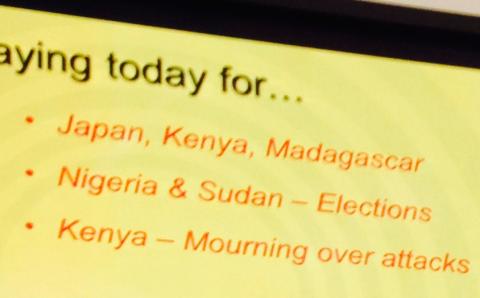Some time ago a young couple—both from Christian homes—asked me to perform their wedding ceremony. I invited them to come to my office to discuss their request. During our conversation, they made it very clear that they wanted their wedding to be totally “neutral.” If I were to officiate at their wedding, they said, I could say anything—but not use the word “Christ.” They were adamant about that fact. Their reason was simple: one of these young people was a Christian but the other had become a non-Christian.
The discussion was intense, and there was no conclusion other than for me to say that I could not function simply as a justice of the peace because as a pastor I am dedicated to the Christian faith and its claim on all of life. Needless to say, the couple—and their parents—were upset with me. But I concluded that I had no choice. Was I wrong in my judgment? Could I possibly have left the door open for some kind of follow-up?
Scripture has always held Christians to a high standard about life issues, and it will continue to do so. But are there instances where major concerns have perhaps changed in terms of their application to the “here and now”? Issues differ in terms of priority and significance, and we often end up agreeing to disagree in such cases. Are views on marriage one such area?
Just how do we as Christians respond when a couple wishes to get married but are very clear about their individual value systems: one being a Christian and the other having a different faith or claiming no faith at all? They love each other, of course, but differ clearly in what they believe and share in their relationship. Should you expect your pastor to perform a ceremony for a couple who are “unequally yoked” and who have compromised their life values in order to be together? It is a question of “to do or not to do”—and these circumstances become occasions for a judgment call by the pastor who is asked to perform the wedding celebration.
Marriage in Scripture
In his lengthy discourse on marriage, 1 Corinthians 7, the apostle Paul expresses his own opinions, for example in verses 6 (“I say this as a concession, not as a command”); 12 (“If any brother has a wife who is not a believer and she is willing to live with him, he must not divorce her”); and 40 (“In my judgment, she is happier if she stays as she is”). He mixes his opinions with the basic instruction that marriage is a holy or sanctifying relationship that must reflect the union of Christ and his followers, the Body—even if one partner happens to believe something other than the Christian faith. In Ephesians 5:31-32, quoting from Genesis 2:24, Paul makes clear that the two becoming one flesh should be a powerful symbol of this union of Christ and his Church. Do such passages leave any room for a pastor to “negotiate” a wedding for a couple when they are of conflicting faiths?
Based on such biblical teachings, I have made the decision to proceed when, for example, the couple represents two differing faiths but are willing to agree to my open presentation concerning the way of Christ. Admittedly, these situations involve a calculation of risk that could end up with non-commitment. But often the results are a growing toward and into the Christian faith as well as a happy marriage bond. As an intermediary for Christ and his cause, in such judgment calls I have witnessed the grace of our Lord became something lively and concrete, demonstrated in a healthy family life and commitment to the church. One senses potential in such cases.
What’s a Pastor to Do?
So what does a pastor do in each and every individual situation? In making any plans for a wedding ceremony I have always insisted on a time of up-front preparation to make sure the couple is fully aware of potential pitfalls and stumbling blocks in their marriage. This is especially true in the case of couples with different faiths or no faith at all. I always instruct them to read a form for Christian marriage in order to remind them that their marriage goes way beyond the wedding ceremony and all the excitement of the happy day. We talk about how our belonging to Christ gives concrete shape and positive expression to each other’s life “until death do us part.”
That conversation always includes open-ended questions, including the following: What do you find attractive about him/her? What do you mean when you say you love him/her, and at what cost? How can you possibly say you’ll stay together for the rest of your lives in light of so many obstacles and uncertainties? You will have disagreements and disappointments: how will you work such things out positively and proactively, not reactively, thereby making healthy choices together along the way? And—so important—you may claim that one of you is “a believer” (perhaps Christian), the other not at all religious. But do you realize that everyone believes in something, regardless of what that belief is? How can these different beliefs work in your marriage? And finally: What direction-setting will you make if you are blessed with children?
The decision to proceed with a marriage ceremony is not a simple line to be drawn, not a matter of black and white or right and wrong. Pastors must be abundantly clear of their own stance with respect to upholding Christian marriage and careful to avoid appearing to yield that stance in any particular situation. However, as Paul makes the case to the Corinthian church, the “rubbing off” of the Christian partner’s faith to the non-Christian one must be the noble aim of a marriage between a couple that is unequally yoked—and such positive outcomes do happen. The grace of Christ often happily transfers from one partner to the other by means of love and tenderness, leading to a common Christ-like faith commitment. The pastor’s job is to clearly inform the couple of why the Christian foundation for marriage is not just an afterthought but the very foundation of and for their future. This understanding will lead them to an honest choice: instead of a “no trespassing” sign that prevents entry, the “gate” of grace is open to them.
Would I be willing to officiate at a wedding for a couple who express two different faiths? It all depends on their response to my explanation. If the couple then agrees to a genuine Christian ceremony I would proceed—but with the full intent and their permission to follow up with them after the wedding has taken place. I have experienced many good results in which the couple has become involved fully with a commitment to Christ and so to one another.
But sometimes that doesn’t happen. Recently one such couple was referred to me by people who knew I was a Christian pastor. Would I perform their ceremony, already planned to take place in a beautiful location? I responded with a conversation in which I discussed the foundations of Christian marriage and outlined what I would ask of them, that is, a Christian commitment to each other for life. I hoped that this would become an occasion for witnessing for Christ and sharing the Good News. The couple listened closely to my explanation. But some weeks later, they cancelled the arrangement since their families were not comfortable with my basic Christian stance. In this case, I needed to fully accept and respect their decision, even though I would very much have preferred a different ending.
Tough decisions? Yes. Are there easy, glib, quick answers? Never! Times have changed, but not the claim of Christ to be the center of all of our lives.
Web Qs
- What does it mean to be “unequally yoked?” Do you think a couple who have different values or beliefs can achieve a healthy marriage?
- Numan begins by describing a couple who wishes to have him conduct a wedding service that is religiously neutral. Do you agree with his decision? Or should he have left the door open?
- How likely is it that a Christian husband or wife will bring his or her partner to Christian faith after they are married? Is this a good reason to enter into such a marriage? Explain why or why not, based on the experiences of people you may know.
- What does the Bible teach about marriage between partners who do not share a common faith? Should pastors err on the side of grace in making their decision about whether or not to marry such couples? Why or why not?
- Numan says, “Issues differ in terms of priority and significance, and we often end up agreeing to disagree in such cases. Are views on marriage one such area?” What do you think?
About the Author
Henry Numan is a retired pastor living in Vancouver, British Columbia. He is still active in volunteer pastoral work in his community and in area congregations.








